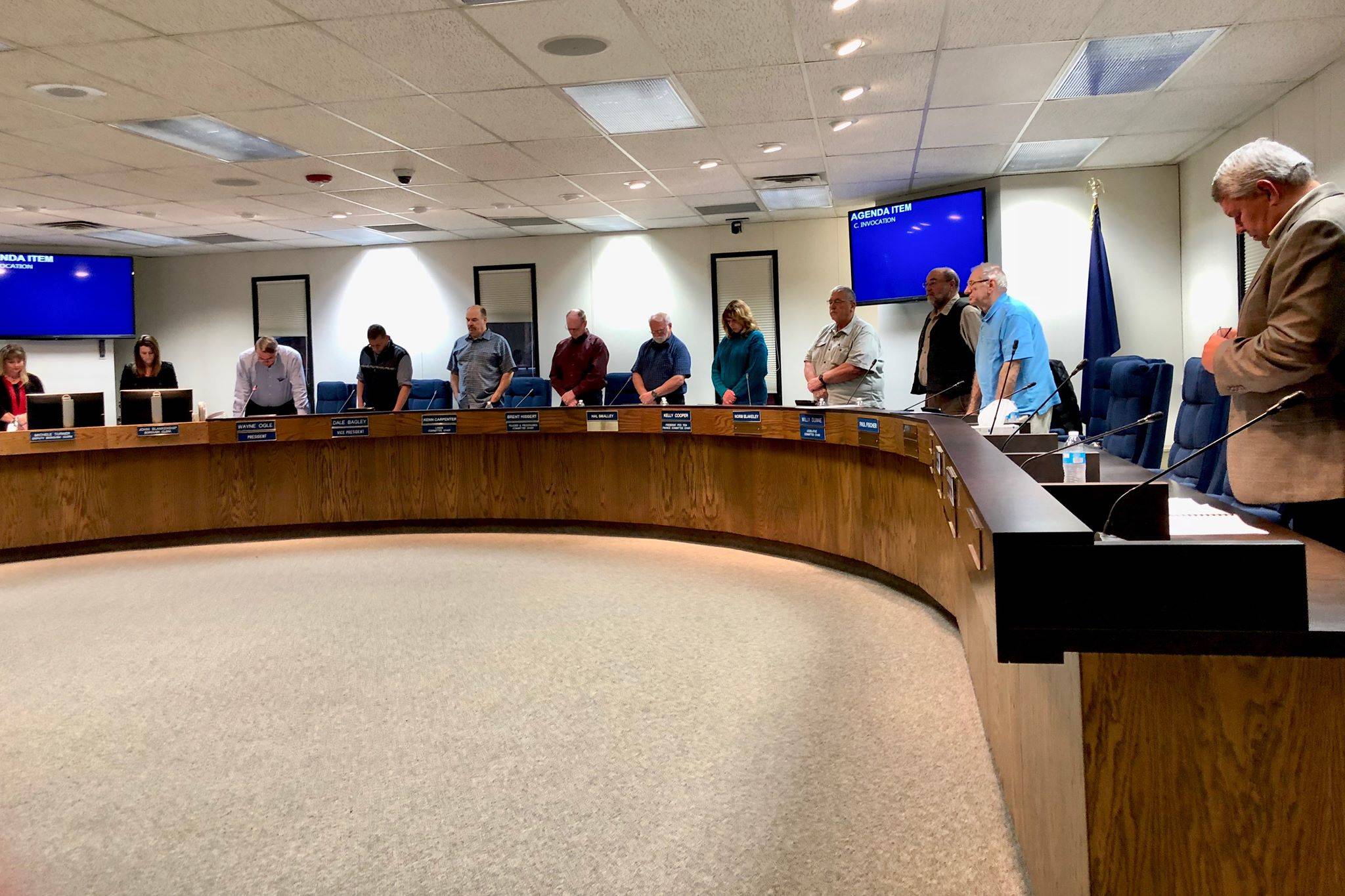Editor’s note: This article has been updated to clarify details about the court ruling on the borough assembly’s invocation policy.
Tuesday’s Kenai Peninsula Borough Assembly meeting was just like any other, starting with the pledge of allegiance and an invocation. Two weeks ago, however, the borough lost a lawsuit against the American Civil Liberties Union of Alaska in a fight over its invocation policy, which allows certain groups and individuals to offer an invocation at the beginning of each meeting.
The Superior Court ruled the invocation policy, passed in 2016, violates the Alaska Constitution’s establishment clause, which is a mandate banning government from establishing an official religion or the favoring of one belief over another’s.
Since then, assembly meetings have two weeks in a row begun with an invocation or an appeal to a higher authority for the benefit of the assembly.
The borough’s resolution allows a chaplain serving the military, law enforcement agencies, fire departments, hospitals or other similar organizations to give invocations before Kenai Peninsula Borough Assembly meetings, as well as people who are members of a religious organization with an “established presence” in the borough that meets regularly.
Tuesday’s invocation was given by Borough Assembly President Wayne Ogle, who gave thanks to “Father God” and offered a number of prayers.
The ACLU of Alaska represented Lance Hunt, an atheist, Iris Fontana, a member of The Satanic Temple, and Elise Boyer, a member of a small Jewish community in Homer. Each submitted applications to give invocations after the resolution passed in 2016, which were denied because they did not belong to official organizations with an established presence on the peninsula.
“Plaintiffs allege that the invocation selection policy implemented through the Resolution violates the prohibition against the establishment of religion, denies them of their freedom of speech and freedom of association, and denies them of their entitlement to equal rights, opportunities, and protection,” the court decision states.
Several members of the community came to the meeting to testify on the issue. Keith Hamilton, who lives in the K-Beach area, encouraged the assembly to appeal the court’s decision.
“Recently a judge has struck down our policy as it is in its current status,” Hamilton said. “Doing what we believe is considered right and appropriate by the far majority of our residents, assembly leaders should not let others divert you for what is best for the borough in keeping these policies as is. Please don’t back down. Please stand firm and know that we are with you. I encourage you to appeal this court decision and take it to the next court. The first amendment protects us from these threats, for which I’m grateful as both an American and an Alaskan.”
Leslie Rohr is the executive director of Love INC, a community program that represents a network of more than 40 area churches of different denominations. She spoke to the assembly on behalf of herself and Love INC.
“My prayer this evening is that the voice of the majority will not be drowned out by the minority,” Rohr said. “There are so many real issues in our community that we could be spending this time addressing. It makes me sad to think that we have people who are in crisis in our community and we are arguing whether or not there should be an invocation when what we need is to restore the moral culture in our community. How better to do that than to have an invocation to call upon our higher power to bless and guide our elected officials as they make decisions that affect each and every one of us.”
Not everyone who spoke felt the borough should appeal the court’s decision. Ed Martin Jr. from Cooper Landing said he personally believed in prayer, but felt the assembly should not seek an appeal.
“I believe this assembly and many of us in this room need prayer,” Martin said. “Now, there are some in this room who may not welcome it. We as prayer givers should accept the fact that we should have some tolerance. So, in my opinion, I don’t believe the assembly should appeal this case. It’s been clear that you’ve been tested by a Superior Court.”
Greg Andersen of Kenai said he’s concerned the legal fight is a poor use of tax dollars.
“It is time to stop spending taxpayer dollars trying to pursue keeping the present policy in place,” Andersen said. “Tens of thousands have been spent so far and I have a feeling since the borough lost they will be on the hook for the ACLU’s legal fees as well. How many tens of thousands will it add up to? A hundred thousand more? Two hundred thousand more when you add what the borough has spent so far? I would love to see the invocation policy eliminated completely, but I have a feeling that it will be fought tooth and nail by some members of the assembly.”
Andersen suggested the assembly have a moment of silence for people to use as they please.
“Last year, there was a suggestion to have a moment of silence to use as you see fit, which would have ended the lawsuit, but was ignored by most members of the assembly,” Andersen said. “My question is: why not use that now? It is simple and everyone qualifies. No lawsuits. I find it reprehensible that my tax dollars have been spent on this. It has to stop. Appealing the court’s decision would be criminal in my opinion.”
During the assembly meeting, Ogle said the borough hasn’t decided to appeal the court’s decision.

